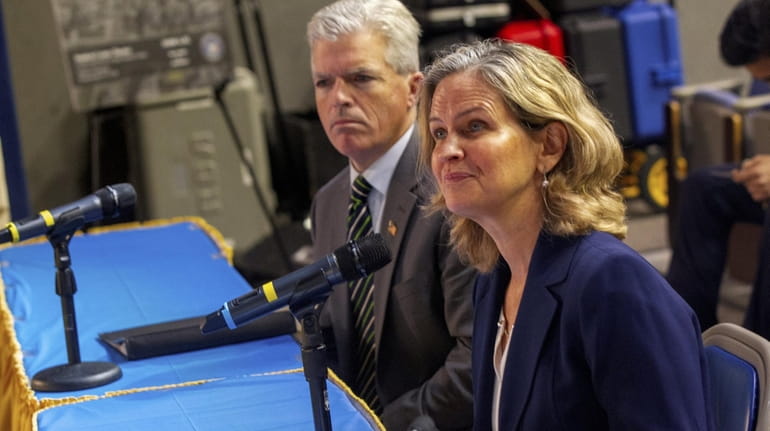Bellone, Curran to seek help in Washington as lawmakers debate stimulus package

Suffolk County Executive Steve Bellone and Nassau County Executive Laura Curran at an event in December 2019. Credit: Howard Schnapp
County executives Steve Bellone and Laura Curran will meet with Long Island’s congressional delegation Wednesday in Washington to lobby for help for their revenue-starved communities as lawmakers debate a coronavirus stimulus package.
The Suffolk and Nassau county leaders will discuss their lobbying at a news conference Tuesday at the Westbury offices of the Long Island Council on Alcoholism and Drug Dependence, to highlight how revenue shortfalls would impact addiction and mental health services as fatal drug overdoses and demands for treatment are spiking.
“We want to get across the fact that counties are on the front line of the issues exacerbated by the global pandemic, drug addiction, mental health and domestic violence,” Suffolk County Executive Bellone said. “We are going to see the impacts of this pandemic for years. This is not the time for the federal government to say, ‘We are OK with hollowing out of local government.’ ”
Bellone and Curran will meet with Long Island House members as well as Senate Minority Leader Chuck Schumer and Sen. Kirsten Gillibrand. Suffolk could lose up to $1.5 billion in revenue by 2022 as a result of the economic shutdown caused by the pandemic, Bellone said. Nassau could suffer a $750 million shortfall by 2022 if it does not get federal relief, Curran said.
“If we don’t get help from the federal government,” Curran said, “it could be bleak."
Fatal drug overdoses jumped by 40% in Suffolk and at least 50% during the first five months of 2020, officials told Newsday last month. The rise in fatal overdoses reverses two years of declines, a setback in the decadelong battle against opioids that have claimed the lives of more than 4,000 Long Island residents since 2010, and addiction experts say there will be more fatalities if the counties can’t pay for drug treatment, education or support for people in recovery.
“This is Long Island’s darkest hour,” said LICADD executive director Steve Chassman. “Long Island has already been hit disproportionately with grief and loss, death and dying from the coronavirus pandemic.”
Chassman and Jeffrey Reynolds, president of the Family and Children’s Association, a Mineola organization that provides counseling and outpatient drug treatment, said their agencies have experienced at least a 20% jump in requests for assistance since New York shut down its economy as the coronavirus pandemic hit Long Island in mid-March.
“The paradox of social isolation is that it keeps you safe from the virus but it makes you vulnerable to suicide, depression and drug overdoses,” Reynolds said.
Bellone said it would not be fair for Congress to shortchange Long Island after the sacrifices business and residents made to combat COVID-19.
“We did everything we were told to do,” Bellone said. “We shut down the economy, we flattened the curve. For the federal government to say ‘Good job, here is the bill,’ would be unacceptable.”
